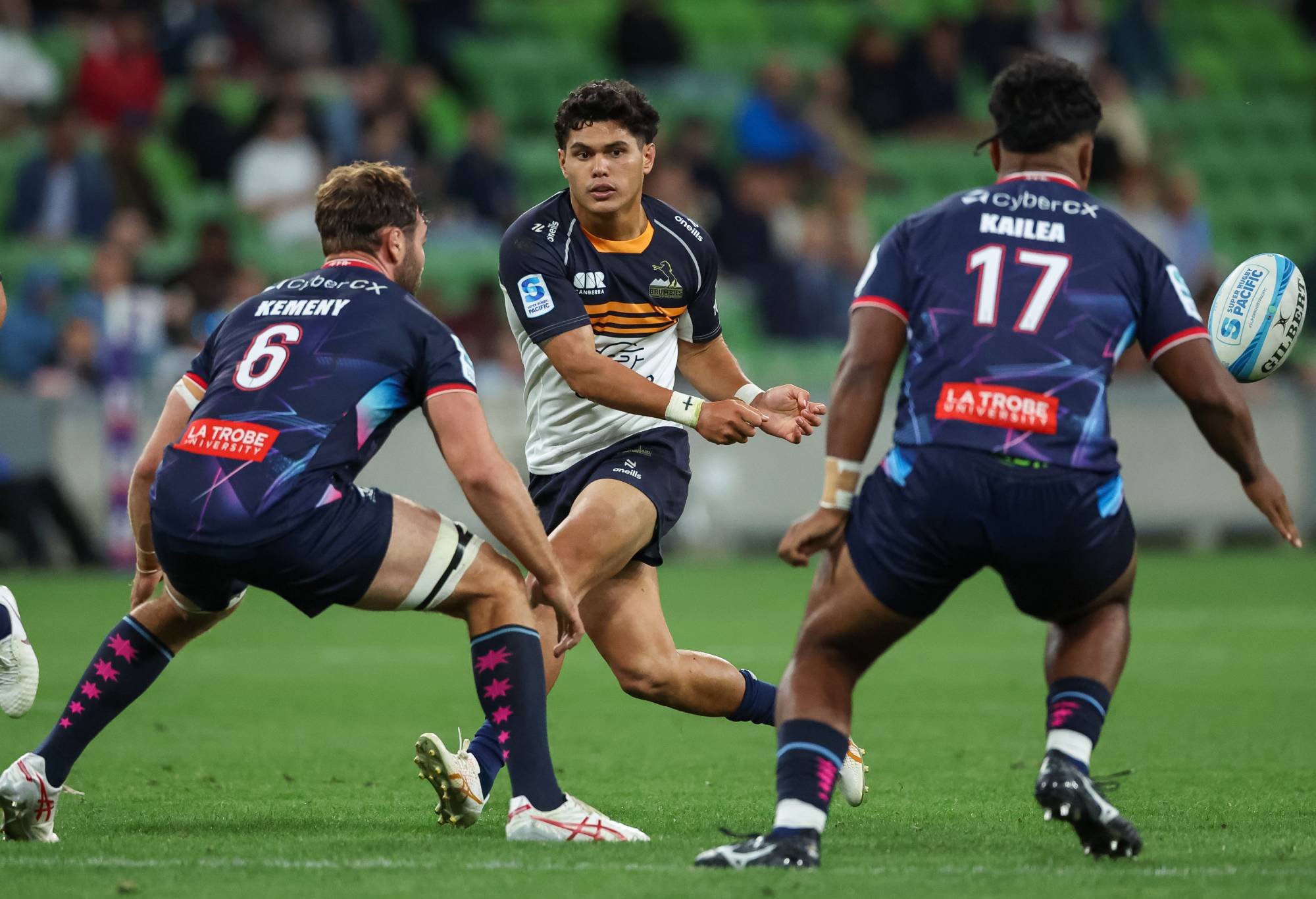Injury concern for Brumbies Blake Schoupp after scrum comes down awkwardly on top of him
Fortunately, the prop was back on his feet but it's likely he'll miss several weeks with that shoulder problem.
The Melbourne Rebels lost badly to the Brumbies at home to open what may well be their last season in Super Rugby.
Having conceded 10 fewer penalties and held 60 per cent territory, both bests in the competition on the weekend, the Melbourne team’s performance presents a unique challenge at this week’s team meetings. The Rebels’ 22-metre entries were easily the highest for any team in round one, with 17.
Their big, physical pack looked precisely that. Post-contact metres and big hits were aplenty at AAMI Park. When dominating in many of the new vogue metrics, and satisfying more old-school ideals of hitting hard, the question remains, where did it all unravel in the 27-point defeat?
It looked like an early-season identity crisis for the Rebels. While fans may have anticipated an exciting game based on some big-name signings, the Rebels failed to create a cohesive unit for effective rugby.
The Rebel’s kick rate was the lowest for any team on the weekend. Twelve times to be exact. It’s a ‘running rugby’ trend for Melbourne that began last year.
The team averaged the third-fewest kicks per game in the 2023 season at just over 20. The SRP Final rematch played on Friday saw both teams kick the ball a respective 25 and 27 times, in a game that was more attack-oriented than nearly any international we’ve seen recently.
The Chiefs and Crusaders, who were the two most frequent kickers last year, and the two most successful teams, epitomise how effective kicking improves an attacking system rather than undermines it.
The Rebels have several underutilised aerial threats, including Andrew Kellaway. They actually won back three of seven kick-offs, and three of 12 in-play kicks.
But the idea of putting boot to ball wasn’t on Rebels’ minds throughout large stages of the game. Three kicks in the first three minutes, three within a couple of minutes on either side of halftime.
Two necessary clearances at around the 50-minute mark, and three when they were out of ideas in the last five minutes. Importantly, for nearly 30 minutes in the first half as a 17-point deficit accrued the home side did not look for kicking options to change the Brumbies’ defensive picture.
Effective kicking encourages opponents to drop more players back to field kicks, particularly since the advent of the 50-22 rule. For example, teams often retain up to four backfield players (flyhalf, wingers, fullback) and a sweeping halfback, thinning the defensive line to 10-11 players which opens space for runs and one-on-one opportunities.
Instead, the Rebels’ reluctance to kick led the Brumbies to crowd the defensive line, daring the Rebels to kick against a thinly spread backfield.
However, a clear disconnect emerged between the Rebels’ backs and forwards. The Rebels forward pack would work best when paired with a strong kicking game.
Instead at flyhalf and fullback, the Rebels have exciting Wallabies who are clearly ‘run first’ players. Carter Gordon had his worst game in a year with five turnovers against the Brumbies.

Noah Lolesio of the Brumbies against the Rebels. (Photo by Asanka Ratnayake/Getty Images)
Meanwhile, Andrew Kellaway was exciting on kick returns, but his willingness to run back only emboldened the Brumbies’ defensive strategy.
When it comes to roster construction, the loss of Reece Hodge as a focal point of the kicking game may not have been immediately recognisable. But much like for the Wallabies in 2023, Gordon is at his threatening best when he doesn’t have to control the kicking game.
To offset the loss of Hodge’s kicking, the Rebels brought in Jack Maunder from England. Maunder is a good halfback and more importantly, a graduate of the Exeter Chiefs’ ‘school of box-kicking’ (Nic White is a fellow alumni).
Maunder’s kicking game is something the Rebels have missed previously, as neither Ryan Louwrens nor James Tuttle were great in-game kickers. But on Friday night Maunder only box-kicked twice, despite the Rebels winning both kicks back.
While some argue that box-kicking is a totally oversaturated art form in international rugby, the Rebels forward-carrying dominance would be more effective if opponents had to manage the threat of a kick. The quick Rebels backline could also find more time and space than they had on Friday night.
The Rebels performance showed considerable promise on Friday night. They paired a powerful scrum with a pack outmuscling the Brumbies in carries, who had their lowest tackle success rate (77%) since 2022 and consequently entered their 22 with ease (17 times).
However, each success was countered by significant flaws. Rebels’ first phase defence was frankly criminal and conceded three of the Brumbies’ four tries, their lineout was ineffectual, and their lack of kicking simplified the defence against them, despite the individual players’ threat.
The Rebels season is by no means over, but they need to figure out a playing style that might allow the talented individuals they have to shine.